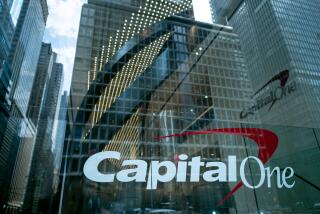Citigroup to Buy Sears’ Credit Unit
Citigroup Inc. agreed Tuesday to buy Sears, Roebuck & Co.’s credit card portfolio in a transaction that would give the retailer $6 billion to reduce debt as it focuses on its department stores.
Sears, exiting consumer finance after 90 years, will get $3 billion from Citigroup and an additional $3 billion of capital that was tied up in the unit, which had $29 billion in loans.
The purchase enables Citigroup Chief Executive Sanford I. Weill, who oversees the largest credit card company, to extend his lead over MBNA Corp. and Bank One Corp.
Sears last year unexpectedly boosted its reserve for unpaid bills after delinquencies surged and fired the unit’s head.
“Citigroup will be better qualified to manage that portfolio than Sears Roebuck,” said Marshall Front, who owns 1.2 million Citigroup shares among the $1.5 billion of assets managed by Front Barnett Associates. Credit cards have “been a driver of their growth this year. It’s a pretty good time to be buying.”
Shares of Hoffman Estates, Ill.-based Sears rose 48 cents to $34.98 and then jumped $6.63, or 19%, to $41.61 in after-hours trading. Shares of New York-based Citigroup fell 29 cents to $46.83 in regular trading and declined 53 cents to $46.30 in after-hours trading. Both trade on the New York Stock Exchange.
Sears Chief Executive Alan Lacy had expanded the company’s Gold MasterCard program to increase revenue. Most retailers hire other companies to handle credit card services.
Profit from Sears’ finance unit, which accounts for almost two-thirds of earnings, fell 11% in the first quarter because Sears had to set aside more funds to cover unpaid bills. Sears put the business up for sale in March.
Sears started letting customers pay for pianos, encyclopedias and farm tools in installments in 1911. The retailer has relied on interest-free financing offers to boost sales of appliances and Craftsman tools.
Sears has relied more heavily on its credit card unit as it has lost market share to rivals such as Kohl’s Corp. and Home Depot Inc.
Standard & Poor’s lowered its rating on Sears to BBB from BBB-plus, saying that although the sale will enable Sears to drop debt, the retailer will lose a “historically important foundation” for its credit rating and income.
The sale also will mean “a greater reliance on a retailing business that has a very challenging future,” S&P; credit analyst Gerald Hirschberg said.
Citigroup’s acquisition will make it the No. 2 private label credit card issuer behind General Electric Co.’s GE Capital unit and allows it to pass HSBC Holdings’ U.S. unit, said David Robertson, publisher of the Nilson Report, an Oxnard-based credit card industry newsletter.
More to Read
Inside the business of entertainment
The Wide Shot brings you news, analysis and insights on everything from streaming wars to production — and what it all means for the future.
You may occasionally receive promotional content from the Los Angeles Times.










